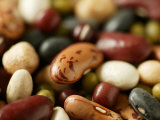Foods High in Dietary Fiber

We've all heard it before: A healthy diet consists of foods high in dietary fiber. But what exactly are those foods and why is fiber so important for good health? Lets take a quick look:
Dietary fiber, also known as roughage or bulk, is the term we use for those parts of the plant that we can’t digest. The body does not digest or absorb fiber, so it passes unchanged through the digestive tract, keeping it clean and healthy. Fruits, vegetables, beans, legumes and some whole-grain foods are all excellent sources of fiber.
There are 2 kinds of fiber – soluble and insoluble fiber:
Soluble fiber dissolves in water and may form a gel. It ferments in the large intestine, producing short-chain fatty acids which have fantastic health benefits. Soluble fiber is found in oats, oat bran, beans, peas, barley, rice bran, nuts, flaxseeds (linseeds) and most fruits and vegetables.
Insoluble fiber does not dissolve in water and adds bulk to the stool, keeping bowel movements regular. Insoluble fiber is found in whole-wheat flour, wheat bran, cabbage, carrots, turnips, cauliflower, beetroot, brussels sprouts and apple skin, nuts and seeds.
Pretty much all plant foods contain both kinds of fiber. There are many wonderful benefits of fiber - a diet high in soluble and insoluble fiber is extremely important for great health.
Health Benefits of Insoluble Fiber:
- Maintains regular bowel movements, preventing constipation: Insoluble fiber is not broken down, staying in solid form and that helps produce a solid, good sized stool that retains more water which moves easily through the digestive tract, making regular bowel movements no strain at all.
- Cleanses the digestive tract: Insoluble fiber remains solid and fibrous and that acts like a brush, collecting all the stray particles in the intestines. They are then easily removed with the normal bowel movement.
- Helps prevent colon cancer: Fiber helps balance the pH in the intestines This prevents microbes producing cancerous substances
- Removes toxic waste quickly through the colon.
- Decreases the risk of heart disease, diabetes and many intestinal problems. A high fiber diet can also lower blood pressure naturally
- Promotes weight loss: Insoluble fiber makes us feel more full, so we tend to eat less. It is also very low in calories.
Health Benefits of Soluble Fiber:
- Helps lower blood cholesterol by absorbing fat and cholesterol from the blood.
- Can increase calcium absorption.
- Keeps blood sugar levels stable: Soluble fiber keeps food in the stomach longer, especially when eaten with lots of fluid and some fat - which means that the sugar in food is released and absorbed more slowly. This is important for people with diabetes.
To summarise, here is a list of
foods high in dietary fiber:
- All fruits
- All vegetables
- All legumes - such as beans, peas, lentils, lupins and peanuts
- Whole grains
- Nuts
- Seeds
I think that it is really important to give the whole family, especially children lots of whole grains, fruits and vegetables to eat. This will keep their bowels healthy and regular, prevent constipation as well as reduce the risk of heart disease and cancer later in life. Children who eat a variety of whole foods and are taught the importance of it, are more likely to continue with this healthy habit later in life.
Return from Foods High in Dietary Fiber to Nutrition Facts
Return from Foods High in Dietary Fiber to Healthy Family Eating Home Page






